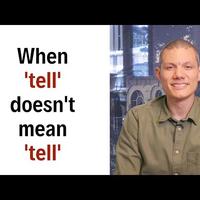When 'tell' doesn't mean 'tell' - English In A Minute
||no|significa|||||
Wenn 'erzählen' nicht 'erzählen' bedeutet - English In A Minute
Cuando 'tell' no significa 'tell' - English In A Minute
Quand "tell" ne veut pas dire "tell" - English In A Minute
Quando "tell" non significa "tell" - Inglese in un minuto
tell」が「伝える」を意味しない場合 - English In A Minute
'tell'가 '말하다'를 의미하지 않을 때 - English In A Minute
Kiedy 'tell' nie oznacza 'tell' - English In A Minute
Quando 'tell' não significa 'tell' - Inglês Num Minuto
Когда "tell" не значит "tell" - English In A Minute
När "berätta" inte betyder "berätta" - English In A Minute
'Söylemek' 'anlatmak' anlamına gelmediğinde - English In A Minute
Коли "сказати" не означає "розповісти" - English In A Minute
当“告诉”不等于“告诉”时 - 一分钟英语
當“告訴”並不意味著“告訴”時 - 一分鐘英語
Hi, everyone!
|todos
Think of 'tell' and you think of speaking,
||說話||||想到|說話
|||||||hablando
伝える』といえば、話すことを思い浮かべるだろう、
'Anlatmak' deyince aklınıza konuşmak geliyor,
but 'tell' doesn't always mean 'tell'.
|||siempre||
Let me tell you why…
déjame||||
なぜかというと...。
Sana nedenini söyleyeyim.
OK that time I meant speaking.
好吧|||||
||||intendevo|
está bien||||me refería|
||||意指|
OK that time I meant speaking.
OK esa vez me refería a hablar.
OK、あの時は話すという意味だった。
В тот раз я имел в виду разговор.
Tamam, o zaman konuşmayı kastetmiştim.
Not only does the verb 'tell' mean
||動詞||||
|solo|||||
Not only does the verb 'tell' mean
'Söylemek' fiili sadece
動詞「告訴」不只有
'say something to someone',
'birine bir şey söyle',
'對某人說點什麼',
it also has a meaning similar to
|||||相似的|
|también||||similar|
它也有類似的含義
'know', 'recognise', 'understand', or 'perceive'.
||||воспринимать
|Identify or acknowledge|||Become aware of
|識別|||感知
wissen|erkennen|verstehen||wahrnehmen
|riconoscere|||
|يتعرف على|||
||||сприймати
|認識する|||知覚する
conocer||||percibir
'know', 'recognise', 'understand', or 'perceive'.
知る」、「認識する」、「理解する」、「知覚する」。
'bilmek', 'tanımak', 'anlamak' veya 'algılamak'.
'biết', 'nhận ra', 'hiểu' hoặc 'nhận thức'.
「知道」、「認識」、「理解」或「感知」。
We often use it in combination with the verb 'can'
|||||結合使用||||
|||||together with||||
|||||поєднанні||||
||usamos|||combinación con||||puede
動詞「can」と組み合わせて使うことが多い。
Genellikle 'can' fiili ile birlikte kullanırız
to make 'can tell' for the present
||||||presente
to make 'can tell' for the present
сделать 'can tell' для настоящего времени
şimdiki zaman için 'söyleyebilir' yapmak
and 'could tell' for the past.
|міг би||||
y|podía||||pasado
ve geçmiş için 'söyleyebilirdi'.
I can tell he's from France. He has an accent!
|||||法國||||口音
|||||||||distinctive pronunciation
|||||||||アクセント
yo|||él es||Francia||||acento
|||||||||акцент
I can tell he's from France. He has an accent!
私は彼がフランス出身だと言うことができます。彼にはアクセントがあります!
Я могу сказать, что он из Франции. У него акцент!
Fransa'dan geldiğini söyleyebilirim. Aksanı var!
Tôi có thể nói anh ấy đến từ Pháp. Anh ấy có giọng nói!
我看得出他來自法國。他有口音!
Or:
または:
We could tell it was going to rain because of the clouds.
|||||||||||雲朵
|||||||||||Wolken
|||||about to||||||
|podíamos ver||||iba a||iba a llover|porque|||las nubes
|могли||||||||||
We could tell it was going to rain because of the clouds.
Nous pouvions dire qu'il allait pleuvoir à cause des nuages.
雲のせいで雨が降るのがわかった。
Мы могли сказать, что собирался дождь из-за облаков.
Bulutlar yüzünden yağmur yağacağını anlayabiliyorduk.
由於有云,我們知道要下雨了。
We often use it to talk about differences.
|||||||Unterschiede
|a menudo||||||diferencias
違いについて話すときによく使います。
Мы часто используем его, чтобы говорить о различиях.
Bunu genellikle farklılıklar hakkında konuşmak için kullanırız.
我们经常用它来谈论差异。
Then, we might use the negative or the question.
|||||否定句|||
|||||否定形|||
||podríamos usar|||la negativa|||la pregunta
Then, we might use the negative or the question.
次に、否定または質問を使用する場合があります。
Тогда мы могли бы использовать отрицание или вопрос.
然後,我們可以使用否定句或疑問句。
Can you tell the difference between
|||||zwischen
の違いがわかりますか
Можете ли вы сказать разницу между
Aradaki farkı söyleyebilir misiniz?
this cup and that cup?
questa||||
|taza|||
このカップとあのカップ?
эта чашка и та чашка?
bu fincan ve o fincan?
这个杯子和那个杯子?
I can't tell the difference between this cup and that cup.
|no puedo|||||||||
このカップとあのカップの違いがわかりません。
Я не могу отличить эту чашку от той.
我分不清這個杯子和那個杯子的差別。
We often use 'can tell' with the pronoun 'you'
|||||||Pronomen 'du'|
|||||||代名詞|
|||||||tú|
We often use 'can tell' with the pronoun 'you'
私たちはしばしば代名詞「あなた」と一緒に「can tell」を使います
'Can tell' kelimesini genellikle 'you' zamiriyle birlikte kullanırız
我們經常將“可以告訴”與代名詞“你”一起使用
to talk about something that many people should
|||||||应该
多くの人がすべきことについて話すこと
говорить о чем-то, что многие люди должны
birçok insanın konuşması gereken bir konu hakkında
谈论许多人应该谈论的事情
find obvious.
|顯而易見
|offensichtlich finden
encontrar|obvio
|очевидное
açık bul.
發現明顯。
You can tell he's an English teacher
du|kann|||||
||||||profesor de inglés
You can tell he's an English teacher
あなたは彼が英語の先生だと言うことができます
Вы можете сказать, что он учитель английского языка
你可以看出他是一名英语老师
– he knows all the answers.
|知道|||
– 彼はすべての答えを知っています。
- он знает все ответы.
- tüm cevapları biliyor.
– 他知道所有的答案。

